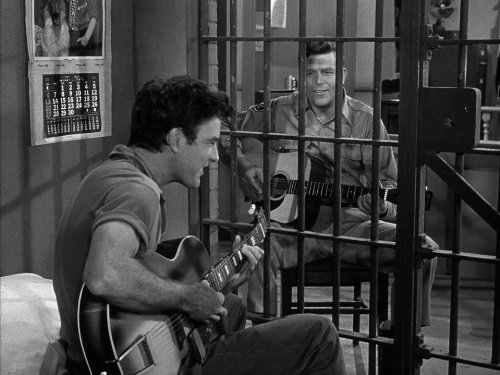
In the gentle, sun-drenched haven of Mayberry, where the most pressing matters often revolved around a misbehaving goat or a particularly stubborn fish, the world typically hummed with a predictable, comforting rhythm. It was a place where peace was paramount, and disruption, however minor, stood out like a rogue note in a perfectly tuned hymn. It is against this backdrop of placid perfection that the story of Jim Lindsey and his guitar unfurled, a vibrant, sometimes dissonant, melody that spoke not just of one young man's ambition, but of Mayberry's unique capacity to nurture dreams, even those that lead far beyond its borders.
Jim Lindsey arrived in Mayberry not with a bang, but with a twang – the insistent, resonant twang of a guitar that seemed to be an extension of his very soul. He was a creature of restless energy, his youth an uncontainable force, and his ambition a palpable hum beneath his skin. Unlike the contented citizens of Mayberry, who found solace in the familiar, Jim yearned for the distant lights of Nashville, for stages and spotlights, for an audience far wider than the congregation at the local church. His guitar, a worn instrument that looked as though it had absorbed a thousand country tunes, was his conduit to that dream, his truest tongue.
For many in Mayberry, Jim’s constant playing was, at best, a charming eccentricity, at worst, an irritating cacophony. Aunt Bee might sigh over the incessant strumming interfering with her knitting, and Barney Fife, ever the stickler for order, saw in Jim’s spontaneous music a threat to the town’s meticulous calm. The guitar, in their eyes, was a source of noise, a distraction from the quiet dignity of Mayberry life. It represented an unfamiliar longing, a disruptive element in their harmonious existence.
But Sheriff Andy Taylor, with his quiet wisdom and uncanny ability to see beyond the surface, heard something different. He heard not just the notes, but the soul behind them – a raw, undeniable talent aching for expression. Andy recognized that Jim’s guitar was not merely an instrument; it was a voice, a passion, a premonition of a destiny that lay beyond Mayberry’s peaceful streets. Andy, unlike Barney, understood that true Mayberry justice wasn't just about enforcing rules; it was about nurturing potential and guiding lives. He saw that for Jim, Mayberry was not meant to be a permanent cage, but a launching pad.
The story truly illustrates Mayberry’s unique character when Andy takes Jim under his wing. Instead of taming the restless spirit, Andy sought to channel it. He didn’t discourage Jim’s aspirations but instead began to clear a path. He arranged an audition in Raleigh, providing not just the opportunity, but the quiet mentorship Jim needed. It wasn't about teaching him how to play – Jim already knew that, with an innate brilliance – but about teaching him the discipline, the punctuality, and the quiet resilience needed to navigate the larger, more demanding world beyond Mayberry. The guitar, which had once been a symbol of Jim’s wild freedom, now also became an emblem of his burgeoning responsibility, a conduit through which he could translate his passion into a professional pursuit.
The pivotal moment, of course, was the audition itself. Jim’s initial fumbling, his tardiness, and his almost self-sabotaging naiveté were the last vestiges of Mayberry’s protective cocoon. But with Andy’s gentle nudging and unwavering faith, Jim finally connected with the music, letting his guitar sing his true story. It was a moment of transcendence, where the small-town boy, with his humble instrument, touched something universal.
When Jim Lindsey finally left Mayberry, guitar case in hand, it wasn't a departure born of rebellion or disillusionment. It was a sending-off, a bittersweet graduation. Mayberry, through Andy’s enlightened guidance, had not just housed Jim; it had prepared him. It had given him a safe space to hone his craft, a quiet audience to practice on, and a wise mentor to smooth his rough edges. His guitar, no longer just a source of localized sound, had become a metaphor for the dreams that Mayberry, in its understated way, helped to cultivate and release into the wider world.
The story of Jim Lindsey and his guitar, therefore, is more than just a charming episode from a beloved sitcom. It is an illustrative essay in itself, painted with the broad strokes of human ambition and the subtle shades of community wisdom. It demonstrates that Mayberry was not a stagnant backwater, but a fertile ground, capable of nurturing dreams that soared far beyond its familiar borders. It reminds us that true care lies not in holding onto what is ours, but in helping others find their authentic melody, even if it means listening to its echoes from afar. And in the quiet strumming that still resonates from Jim Lindsey's tale, we hear the enduring harmony of a place that understood the profound power of a dream, and the instrument that carried it.